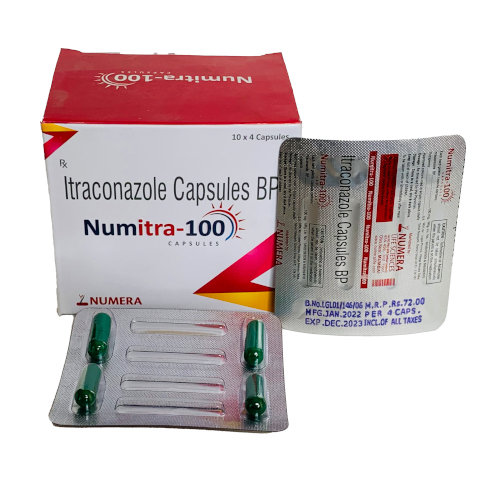
Brand Name : NUMItra 100
Composition : Itraconazole 100mg Capsules
Packing : 10 X 4
Price : Rs. 720
Quick EnquiryThe antifungal drug itraconazole capsule can be used to treat certain fungal and yeast infections throughout the body, including the lungs, mouth, throat, fingernails, and toenails. Itraconazole can be found in tablet, capsule, and oral solution formulations.
To treat fungal infections of the toenails, itraconazole capsules are administered. In addition, oral formulations containing itraconazole may be used to cure yeast infections of the throat, mouth, and oesophagus. Itraconazole is a triazole antifungal medication.
In what ways are Itraconazole capsules used?
- Taking an Itraconazole capsule will treat certain fungal diseases. The azole antifungal class of drugs includes itraconazole capsules.
- Itraconazole works by inhibiting the formation of ergosterol, a key component of fungal cell membranes.
- The fungal cell membranes are essential to their survival as they prevent the leaking of cell material as well as the uptake of unwanted material, thereby weakening and becoming susceptible.
- Consequently, the major components of the fungus's cells leak out, and the fungi die, leading to successful treatment of the fungal infection.
How and when to take Itraconazole Capsules?
Before using any of the items listed on your prescription label, make sure to read all medication guidelines or instructions. Take the medication in the manner directed.
- Consume the itraconazole capsule with a meal. The capsule should be swallowed whole rather than crushed, chewed, broken, or opened. Take an Itraconazole tablet on an empty stomach, at least 60 minutes before or two hours after a meal.
- Take Itraconazole capsule with a full glass of acidic drink, for example, non-diet cola, if you are on a stomach acid-reducing drug like Zantac or another.
- Take this drug for the full amount of time directed by your doctor, even if your symptoms get better soon. Skipping doses can raise your risk of getting a drug-resistant infection.
What are the Side Effects of Itraconazole Capsule?
If you experience the symptoms of congestive heart failure, tiredness, shortness of breath, fast heartbeat, rapid weight gain, insomnia and cough with phlegm, discontinue the use of Itraconazole and consult your doctor immediately. Observe if you experience the following symptoms:
- Confusion is a light-headed sensation as though you're going to faint.
- Visual disturbances consist of double vision, ear ringing, and hearing loss.
- Rapid Heartbeats
- Bladder control problems, tingling or numbness
- Hepatic issues include jaundice, dark-colored urine, nausea, upper abdominal discomfort, exhaustion, and lack of appetite.
- Pancreatitis results in nausea, vomiting, and intense pain in the upper abdomen that spreads to your back.
- Low potassium level symptoms are leg cramps, palpitations in the chest, frequent thirst or urination, muscle weakness, or a feeling in a limb.
Itraconazole's Capsule common side effects include:
- Headache, dizziness, drowsiness
- Increased blood pressure
- Skin rash
- Nausea, vomiting, diarrhoea, constipation
- Changes in your menstrual cycle
- Abnormal liver function
- Bad taste after taking the medication
- Difficulty having an erection
Precautions
- Discuss antifungal medication allergies with your physician before taking Itraconazole, as the product can have active ingredients that may create dangerous side effects.
- Tell your doctor if you use any vitamins, dietary supplements, herbal remedies, prescription or over-the-counter medications. Any antacid medication should be taken one hour before and two hours after taking Itraconazole Capsule.
- If you experience any of the symptoms of congestive heart failure, including tiredness, breathlessness, a mucus cough, abnormal heartbeat, swelling, rapid weight gain, or sleeping problems, discontinue Itraconazole and talk to your doctor at once.
- Itraconazole Capsule can cause dizziness; do not drive or use heavy machinery if you experience dizziness after taking this drug.
- It is not advisable to use Itraconazole during pregnancy. Let your doctor know if you are pregnant, becoming pregnant, or breastfeeding before taking this medicine.
What if I have missed the dose or have an overdose of Itraconazole?
- The skipped dose has only a chemical change in your body for the worse. In some situations, if you skip a dose, you may be advised by your doctor to take the prescribed medication as soon as possible.
- You are likely to increase the risk of affecting your body negatively by taking more than the prescribed dose of Itraconazole capsules. Call your doctor immediately or make an immediate visit to the emergency room of the nearest hospital.
What are the storage conditions of Itraconazole Capsules?
- Itraconazole capsules must be stored between 15 and 25 °C (59 to 77°F) at room temperature. Store the capsules in a dry place and away from light.
- Itraconazole oral solution must be stored at or below 25 °C (77°F). Do not freeze the oral solution.
- Store Itraconazole in the original container, which must be kept tightly closed.
- Caution with other medicines
- Combining some drugs is sometimes not recommended. This is because some medications may interact with other medications in your bloodstream, potentially worsening the condition or reducing the effectiveness of treatment.
- Various medications interact with Itraconazole. Tell your doctor about all the drugs you are currently using and any new or stopped ones.
- This detailed disclosure assists your physician in evaluating possible interactions, modifying dosages, or selecting other medications to keep your treatment both safe and helpful. Close interaction with your healthcare professionals is necessary for individualised and maximised medical attention to avoid the dangers of drug-to-drug interactions.